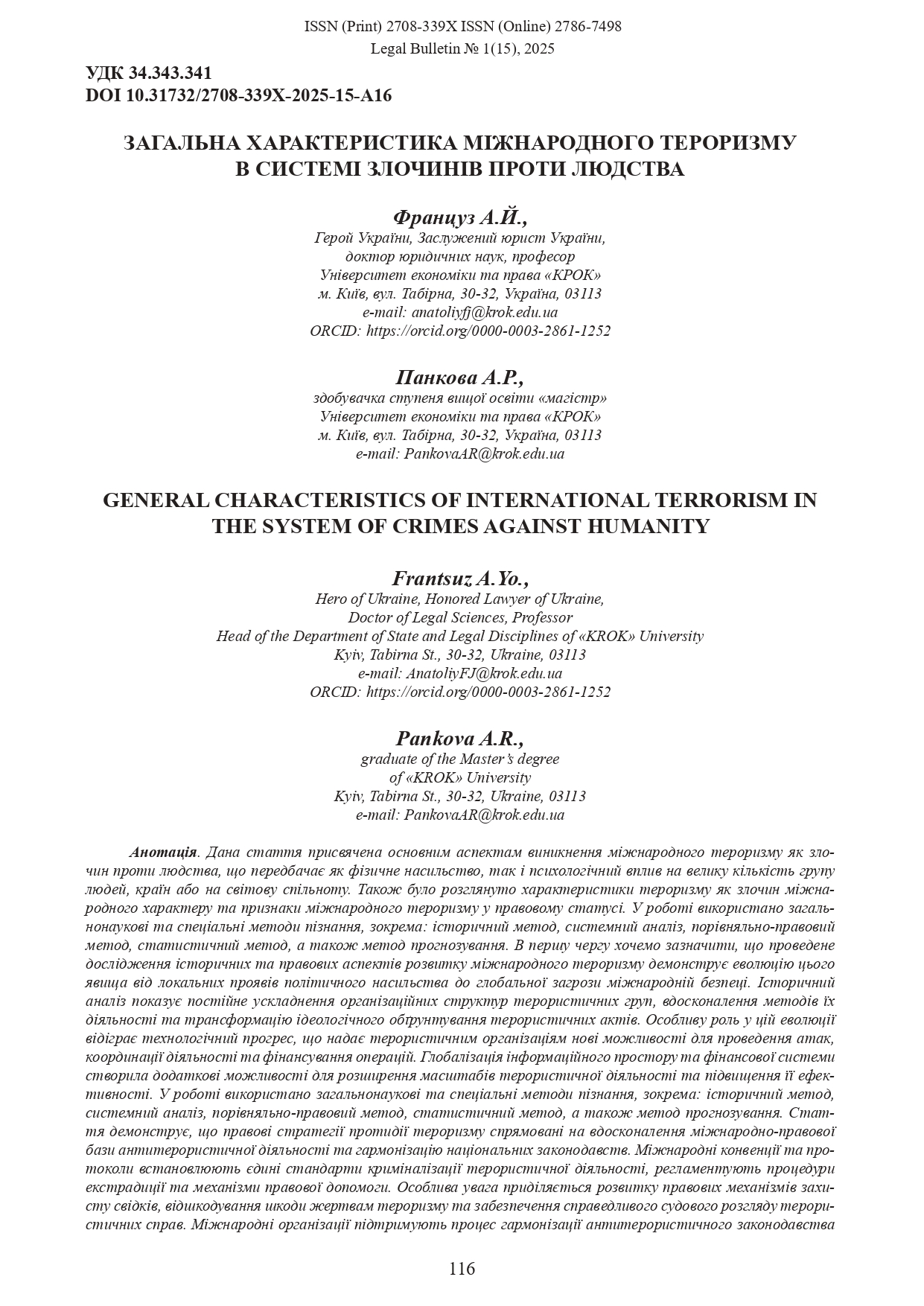GENERAL CHARACTERISTICS OF INTERNATIONAL TERRORISM IN THE SYSTEM OF CRIMES AGAINST HUMANITY
DOI:
https://doi.org/10.31732/2708-339X-2025-15-A16Keywords:
іnternational terrorism, terrorism, international level, international organization, law.Abstract
. This article is devoted to the main aspects of the emergence of international terrorism as a crime against humanity, which involves both physical violence and psychological impact on a large group of people, countries, or the world community. The characteristics of terrorism as a crime of an international nature and the signs of international terrorism in legal status are also considered. The work uses general scientific and special methods of cognition, in particular: the historical method, systems analysis, the comparative law method, the statistical method, as well as the forecasting method.
First of all, it is important to note that the conducted study of the historical and legal aspects of the development of international terrorism demonstrates the evolution of this phenomenon from local manifestations of political violence to a global threat to international security. Historical analysis shows the constant complication of the organizational structures of terrorist groups, the improvement of their methods of activity, and the transformation of the ideological justification for terrorist acts. Technological progress plays a special role in this evolution, providing terrorist organizations with new opportunities to carry out attacks, coordinate activities, and finance operations. The globalization of the information space and the financial system has created additional opportunities for expanding the scale of terrorist activities and increasing their effectiveness.
The article demonstrates that legal strategies for countering terrorism are aimed at improving the international legal framework for anti-terrorist activities and harmonizing national legislation. International conventions and protocols establish uniform standards for the criminalization of terrorist activities, regulate extradition procedures, and legal assistance mechanisms. Special attention is paid to the development of legal mechanisms for witness protection, compensation for victims of terrorism, and ensuring fair trials of terrorist cases. International organizations support the process of harmonizing anti-terrorist legislation through the provision of technical assistance, the development of model laws, and expert consultations.
References
Гбур З. В. Теоретико-методологічні засади поняття «Міжнародного тероризму». Державне управління: удосконалення та розвиток. 2021. № 2. URL. http://www.dy.nayka.com.ua/pdf/2_2021/5.pdf (дата звернення: 25.12.2024).
Про боротьбу з тероризмом : Закон України від 20.03.2003 р. № 638-IV. Відомості Верховної Ради України (ВВР). 2003. № 25. Ст. 180.
Середа В. В., Серкевич І. Р. Тероризм: кримінологічна детермінація і кримінально-правова протидія: монографія. Львів : ЛьвДУВС, 2016. 188 с.
Марков К. А. Міжнародний тероризм як міжнародний злочин. Юридичний науковий електронний журнал. 2021. № 10. С. 596-598.
Стукаліна О. В. Терористична діяльність у сучасному світі: закономірності, детермінація та запобігання. Морська безпека та оборона. 2023. № 2. С. 146-154.
Арпентій С. П. Кримінально-правове визначення тероризму. Юридичний науковий електронний журнал. 2021. № 4. С. 425-428.
Про запобігання та протидію легалізації (відмиванню) доходів, одержаних злочинним шляхом, фінансуванню тероризму та фінансуванню розповсюдження зброї масового знищення : Закон України від 06.12.2019 р. № 361-IX. Відомості Верховної Ради України (ВВР). 2020. № 25. Ст. 171
Кудінов С. С. Міжнародний досвід протидії тероризму та його значення для України. Вчені записки ТНУ імені В.І. Вернадського. Серія: юридичні науки. 2019. № 1. С. 117-123.

Downloads
Published
How to Cite
Issue
Section
License
Copyright (c) 2025 Француз А.Й., Панкова А.Р.

This work is licensed under a Creative Commons Attribution 4.0 International License.




